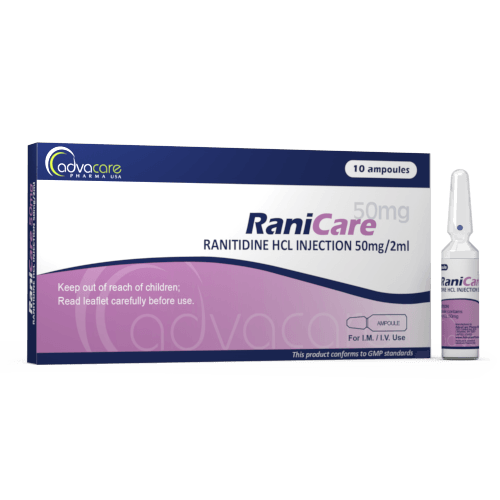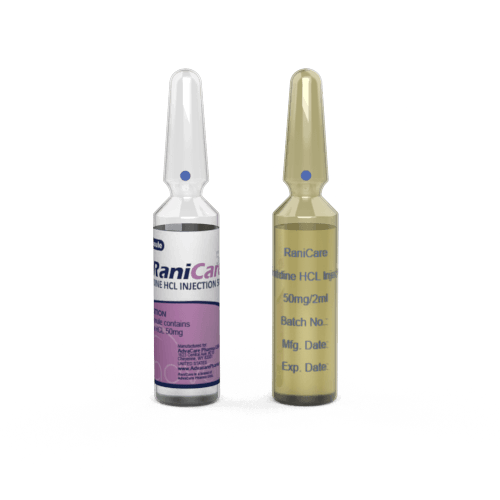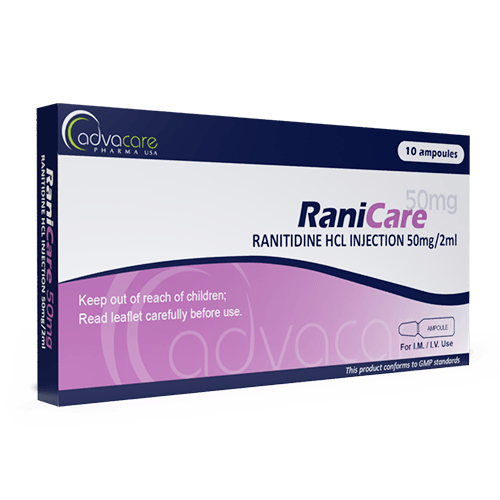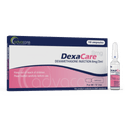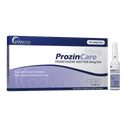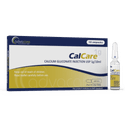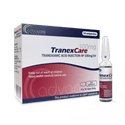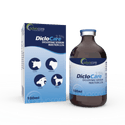- Home›
- Pharmaceuticals›
- Injections›
- Small Volume Injections›
- Ranitidine HCl Injection
Ranitidine HCl Injection
Dosage
Packaging
What is Ranitidine HCl?
Active Ingredients: Ranitidine HCl
For safer alternatives, consider other medications such as Omeprazole.
Ranitidine HCl Injection is used to treat duodenal, benign gastric, and post-operative ulcers. This drug is used to treat conditions associated with excess stomach acid, such as Zollinger-Ellison Syndrome. It may also be used to prevent Mendelson's Syndrome (acid aspiration) before anesthesia in at-risk patients.
This medication is indicated as prophylaxis for gastrointestinal bleeding caused by ulcers in patients with serious illness and recurrent hemorrhage associated with bleeding peptic ulcers. Ranitidine HCl Injections are approved for children over 6 months old for the treatment of gastroesophageal reflux disorder and the short-term treatment of peptic ulcers.
Ranitidine HCl is in a class of medications called H2 blockers. The active ingredient works by blocking histamine from the H2 receptors. This decreases the amount of acid produced in the stomach.
Ranitidine HCl injection is available in 2ml ampoules that contain 50mg Ranitidine in a 2ml aqueous solution. Each 1ml contains 25mg of Ranitidine.
AdvaCare Pharma is a global distributor and manufacturer of Ranitidine HCl Injections. Our supply chain is thoroughly vetted to ensure it meets health, safety, and environmental standards. This medication is produced in our GMP-certified facilities in China, India, and the USA.
Why are we a leading Ranitidine manufacturer?
AdvaCare Pharma is an American-owned pharmaceutical company that specializes in the manufacture of Ranitidine Injection and 120+ other quality-assured injectable medications for the worldwide market. Over the past twenty years, we've built our reputation on reliable, efficacious, and affordable medical products and custom-tailored marketing plans to meet regional demands. Our status as a trusted Ranitidine manufacturer is backed by medical distributors, doctors and patients who rely on our injectable treatments.
Uses
What is Ranitidine HCl used for?
It is used to treat duodenal, benign gastric, and post-operative ulcers. It is used to treat certain conditions associated with excess stomach acid such as Zollinger-Ellison Syndrome or reflux esophagitis.
It may also be used to prevent Mendelson's Syndrome (acid aspiration) before anesthesia in at-risk patients, gastrointestinal bleeding caused by ulcers in patients with serious illnesses, and recurrent hemorrhage associated with bleeding peptic ulcers.
How is Ranitidine HCl Injection used?
This medication is manufactured as a solution. It should be administered by IV/IM injection with a calibrated infusion device at a slow and controlled rate.
What dose should be given?
The usual dose for adults and children is dependent on the patient and the medical condition.
When administering a Ranitidine HCl Injection, it is especially important to monitor for potential adverse effects such as changes in cardiac function, electrolyte imbalances, and alterations in acid-base balance. It should not be infused rapidly in order to prevent potential adverse reactions.
Refer to a doctor or pharmacist for guidelines on the exact dosage.
Side Effects
As with all pharmaceuticals, some unwanted effects can occur from the use of Ranitidine HCl Injection.
Common side effects include, but may not be limited to:
- dizziness
- drowsiness
- swelling near the injection site
Serious side effects may include: • signs of an allergic reaction
For a comprehensive understanding of all potential side effects, consult a medical professional.
If any symptoms persist or worsen, or you notice any other symptoms, please call your doctor.
Precautions
Do NOT use Ranitidine HCl Injection if:
- You are allergic to Ranitidine Hydrochloride Injection or any other containing ingredients.
- You are allergic to ester-group local anesthetics or substitute products in the category of parahydroxybenzoate type.
Before treatment, consult your doctor regarding any medications you are taking to address potential drug interactions.
This medication may not be suitable for people with certain conditions, so it is important to consult with a doctor if you have any health conditions.

You might be interested in...
Why AdvaCare Pharma?
As an industry leader, we are aware of our responsibility to provide affordable and sustainable solutions to improve healthcare worldwide.
